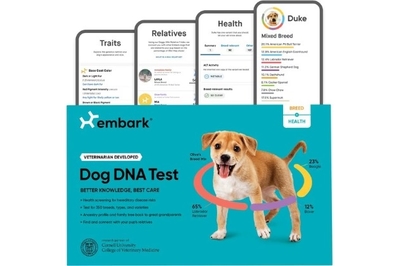The 2 Best Dog DNA Tests of 2025

With its sizable breed-reference panel and a robust list of the genetic health conditions it reviews, the Embark Breed + Health DNA Test delivers clear breed results. One of Embark’s founders is a canine genetics professor at the Cornell University College of Veterinary Medicine, and the company employs nine full-time canine geneticists and three veterinarians who have advanced training. Note that the tests from Embark and Wisdom Panel (the company that makes our other top pick) are very similar in many of the ways we describe below. But their results will vary, and we highlight some of the more significant differences between the two tests.
You can view the Embark dashboards of our test dogs here: Sephora, Gus, Sparky, Sutton, Swanson, Huey, and Gucci.

Embark analyzes roughly 100,000 markers of your dog’s genetic code. Embark used to analyze more than 200,000 markers, but the company has reduced that number to about 100,000, according to David Haworth, executive vice president at Embark. (Wisdom Panel currently analyzes a similar number of markers). But, Haworth said, “We’re actually much better with those hundred [thousand] than we were with the 250 to 300 thousand that we were testing two years ago.” While having a lot of markers helps with accuracy, too many markers might lead to diminishing returns. “More isn’t necessarily better after a certain point,” according to Llewellyn-Zaidi. After a few hundred thousand markers, “more could just be more. It’s about how well they describe or relate to the breed that they’re trying to identify.”
The company has a large dog-breed database. Embark’s reference panel, which it compares a dog’s DNA against, includes about 33,000 dogs, according to Haworth. The company uses that reference panel to identify more than 350 different breeds, including village dogs from several geographic regions. Wisdom Panel’s reference panel is only slightly smaller, with about 27,000 dogs. Embark’s algorithm can identify 100% of the roughly 200 dog breeds currently recognized by the AKC, “and then another 150-plus village dog variants, hybrids, and designer breeds,” according to Haworth.
Your dog might be part “Supermutt,” and that’s okay. When Embark’s results get down to around 3% to 5% of the dog’s ancestry, “it’s too small to call,” said Haworth. Both Wisdom Panel and Koko Genetics include breed results down to 1%. Embark instead lumps those smaller breed results into its “Supermutt” category. “We would rather be right than be falsely confident,” said Haworth. Because, he said, “when you get down to the smaller percent breeds, statistics alone tell you, I shouldn’t put a lot of emphasis on that.” Those smaller percentages might not be very useful to you anyway. “The other flip side of it is, if your dog has 5% of something, it’s very unlikely to affect anything at all,” said Jessica Perry Hekman. In our 2025 testing, Gucci came back as being 48% Supermutt, a designation we found somewhat disappointing, but Haworth assured us this was an extremely rare result. Usually Supermutt makes up about 5% to 7% of a dog’s results, he said.
You can find your dog’s relatives — if they’re in the database. As you can with some human DNA tests, with Embark you can find some of your dog’s relatives based on how much DNA they share. We found this feature to be fun, exciting, and, in some cases, deeply heartwarming. While Gucci shared just 16% of his DNA with some of the dogs in Embark’s database, Huey had a 44% overlap with a dog named Cowgirl Dallas. You can also message your dog’s long lost relative through the app to try to deepen the connection. We reached out to Cowgirl Dallas’s caretaker but haven’t gotten a response yet. Wisdom Panel also found some of Huey’s close relatives in its database, but messages to their caretakers likewise went unanswered (Bruno, if your person is reading this, tell them you have a brother!). Gucci shared only about 3% of his DNA with other dogs in Wisdom Panel’s database, and Koko Genetics failed to turn up any relatives for either test dog.
You can see an estimate of your dog’s allergy risks. Embark is the only test we tried that assesses your dog’s potential risk of developing environmental, food, contact, and flea allergies. Gucci had an above-average risk score in all four of these categories. He does indeed suffer from skin rashes and itchiness, which his vet suspects is a contact allergy, and he currently takes medication for it. Huey was reported to be at an elevated risk for developing food, environmental, and contact allergies, but he is at a lower risk of flea allergies. Huey’s caretaker said she recently became aware of his allergies, and she said she’s been monitoring Huey’s symptoms with his vet. She said she thought Embark’s allergy results were useful “at least to weigh as a data point along with his symptoms and what the vet is saying.”

Customer service is responsive, and turnaround times are reasonable. In our 2025 testing, Embark returned results between seven and 12 days after confirming the arrival of the swabs at its lab. Wisdom Panel was similar, returning results between 11 and 13 days after confirming receipt. Koko Genetics took the longest by far, delivering reports roughly 35 days after it received the swabs. When we emailed Embark’s support team, someone usually responded within one business day.
Flaws but not dealbreakers
Embark’s health results could give better guidance. Embark offers genetic health tests for more than 270 diseases. In our testing, Embark flagged a few specific genetic mutation types that Wisdom Panel and Koko Genetics didn’t note because the latter two companies don’t currently test for them. While the company tries to make it clear whether a “notable” or “increased risk” health result is something you should actually worry about, we think they could do a better job at this. We found some of Embark’s explanations confusing. But when Gucci was determined to be at an “increased risk” of developing a mast cell tumor, the explanation page did give some useful guidance on how to handle this type of result (in this case, it said to monitor him and bring him to the vet if any lumps are noticed). Both Embark and Wisdom Panel tell you to discuss your health test results with your vet. Unfortunately, “there isn’t actually much genetics training for veterinarians either,” said Karlsson, so “they may not be able to help a whole lot with that.” Embark also offers the option to have a video chat with an in-house “vet pro,” but the service costs $12 a month, after a 30-day free trial.
The large collection wand might be uncomfortable for small dogs. Embark had the largest collection wand of any DNA test we reviewed, and it might be hard to maneuver around a small dog’s mouth. The swab itself looks like an oversize cotton swab, and it’s approximately four times larger than other swabs we used in this guide. Our testers with dogs under 20 pounds said it was difficult to fit the swab between their dogs’ cheeks and gums. Wisdom Panel uses two swabs that look like thin pipe-cleaner brushes.
The company owns your data. Embark’s privacy policy and terms of service grant it the right to share or sell de-identified information about your dog to third parties, including researchers and commercial partners. Wisdom Panel treats the content you provide similarly. “The policy documents for both companies appear to claim ownership over anything you upload — including your pet’s genetic test result data but also posts on their site, pictures of your pets, et cetera,” said Max Eddy, Wirecutter’s security and privacy reporter. But, unlike Wisdom Panel, Embark does allow you to opt out of participation in its research program; you can do this when you activate your kit, or you can send an email afterward if you change your mind. (It’s unclear whether you can withdraw consent for other types of sharing.) And, at your request, the company will inform you of any information it has collected about you over the past year, and it will delete that information unless it’s already part of a scientific research project.







